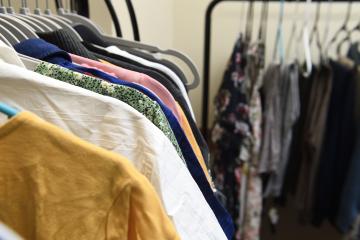Johns Hopkins University provides plentiful opportunities for students to explore their personal interests and identities—whether in the courses and majors of study they pursue, the student organizations in which they participate, or the friends they make along the way. Such exploration is one of the key aspects of a higher education experience, and a new resource at Hopkins is broadening that scope of intentional discovery, both for students and for any Hopkins affiliate.
The Gender Affirming Closet, an initiative brought forth by Erin Fox, senior manager for strategic initiatives in the Office of Diversity and Inclusion, and Abbey Nawrocki, associate director of Gender & Sexuality Resources in the Office of Student Affairs, offers clothing, accessories, makeup, and additional resources at no cost to Hopkins community members to support their gender identity expression and exploration.
Video credit: Roy Henry and Aubrey Morse/JHU
Recognizing that students, faculty, and staff, come to Hopkins from areas across the country and across the globe, Fox and Nawrocki saw that community members didn't always come from areas with a positive climate for exploring one's gender identity. But they also knew that anyone who comes to Hopkins should feel as though they are fully a member of the community. The closet provides physical resources to support that effort, and the individuals involved provide that support on a personal level.
"This service is affirming people's gender identity, where you're going into a space and you're going to be supported," Fox says. "Folks are going to be excited and happy that you're there, trying out something new and making moves to become more yourself."
The Gender Affirming Closet is supported by Diversity Innovation Grant funding, which advances diversity, equity, and inclusion efforts across the institution. Fox and Nawrocki also solicited community support in the form of a clothing donation drive, partnering with individuals across the institution to set up drop off sites at the Applied Physics Lab, East Baltimore, Harbor East, Peabody, and Homewood campuses. All told, Hopkins affiliates donated over 700 individual clothing items that were carefully inventoried and organized by the student staff in Gender & Sexuality Resources. The donations allow Fox and Nawrocki to use the grant funding for more specialized items and services, such as chest binders, makeup products, and tailoring clothing items for individual needs—and if someone can't find a clothing item in the closet, Fox and Nawrocki can use the grant funding to order it for them.
"The idea that other people in the Johns Hopkins community are affirming of your gender, so they gave you something to show that support—I think it's just really beautiful," Fox says.
A launch event for the closet held at the Scott Bate Commons, Salon A, on Tuesday, March 28, gave students, faculty, and staff a first glimpse at the service and its potential, and offered a chance for transgender and non-binary affiliates to create a community with one another. With a small portion of the 700 items in the closet on display, attendees expressed their excitement and interest in accessing the full closet when it opens. Moving forward, the headquarters for the closet will be located at Nawrocki's office at the Center for Diversity and Inclusion on the Homewood campus. While the exact schedule for the closet is still being determined, trained volunteers are expected to be available to staff the closet two days per week during the academic year, with appointments available as well for scheduling conflicts or privacy concerns. Fox and Nawrocki are hoping to partner with campus or student organizations to have additional pop-up experiences for locations across the Hopkins campuses—the first of which is an appearance at the Life Design Lab's career closet event this Friday, March 31, to empower students to dress in a professional way that aligns with their identity.
Image caption: Erin Fox, left, and Abbey Nawrocki
Image credit: Will Kirk / Johns Hopkins University
Fox and Nawrocki are hopeful that the resource becomes embedded in the culture and community at Hopkins for years to come, both for those who use it and those who don't. Nawrocki says they have received feedback from students who identify as transgender or non-binary, who said that while they don't need to use the closet for their individual needs, they were comforted to know it was available.
"Even if folks aren't engaging with the service, it's indicative of our commitment to promoting inclusivity on campus," Nawrocki says.
Fox added, "We're coming out to support one another in our identities, and people not only feel like they're included, but they know that they're included because of programs like this."
Posted in University News, Student Life
Tagged lgbtq life, student life, inclusion








